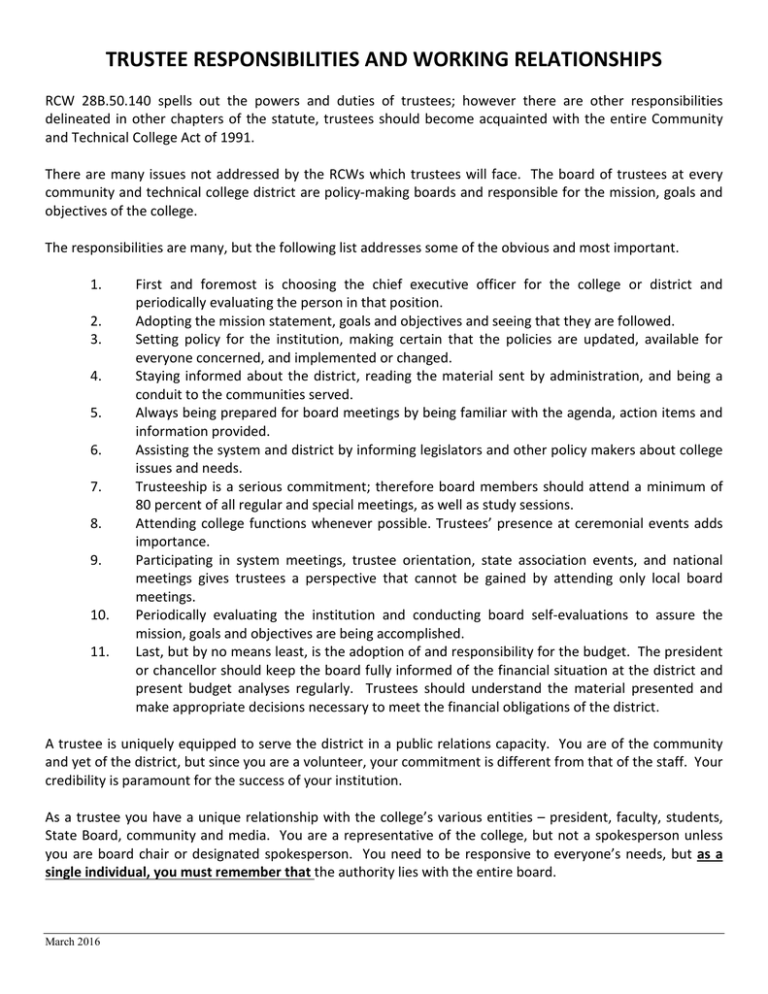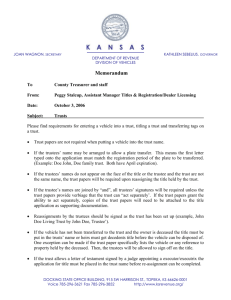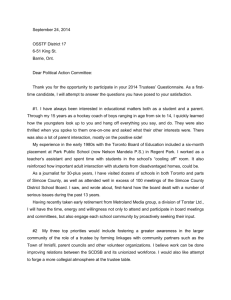TRUSTEE RESPONSIBILITIES AND WORKING RELATIONSHIPS
advertisement

TRUSTEE RESPONSIBILITIES AND WORKING RELATIONSHIPS RCW 28B.50.140 spells out the powers and duties of trustees; however there are other responsibilities delineated in other chapters of the statute, trustees should become acquainted with the entire Community and Technical College Act of 1991. There are many issues not addressed by the RCWs which trustees will face. The board of trustees at every community and technical college district are policy-making boards and responsible for the mission, goals and objectives of the college. The responsibilities are many, but the following list addresses some of the obvious and most important. 1. 2. 3. 4. 5. 6. 7. 8. 9. 10. 11. First and foremost is choosing the chief executive officer for the college or district and periodically evaluating the person in that position. Adopting the mission statement, goals and objectives and seeing that they are followed. Setting policy for the institution, making certain that the policies are updated, available for everyone concerned, and implemented or changed. Staying informed about the district, reading the material sent by administration, and being a conduit to the communities served. Always being prepared for board meetings by being familiar with the agenda, action items and information provided. Assisting the system and district by informing legislators and other policy makers about college issues and needs. Trusteeship is a serious commitment; therefore board members should attend a minimum of 80 percent of all regular and special meetings, as well as study sessions. Attending college functions whenever possible. Trustees’ presence at ceremonial events adds importance. Participating in system meetings, trustee orientation, state association events, and national meetings gives trustees a perspective that cannot be gained by attending only local board meetings. Periodically evaluating the institution and conducting board self-evaluations to assure the mission, goals and objectives are being accomplished. Last, but by no means least, is the adoption of and responsibility for the budget. The president or chancellor should keep the board fully informed of the financial situation at the district and present budget analyses regularly. Trustees should understand the material presented and make appropriate decisions necessary to meet the financial obligations of the district. A trustee is uniquely equipped to serve the district in a public relations capacity. You are of the community and yet of the district, but since you are a volunteer, your commitment is different from that of the staff. Your credibility is paramount for the success of your institution. As a trustee you have a unique relationship with the college’s various entities – president, faculty, students, State Board, community and media. You are a representative of the college, but not a spokesperson unless you are board chair or designated spokesperson. You need to be responsive to everyone’s needs, but as a single individual, you must remember that the authority lies with the entire board. March 2016 Board/President – There must be an atmosphere of trust between the board and the president. If trust isn’t there, the college cannot possibly prosper. The president must keep his or her board informed and the board must read the material provided, be willing to listen, ask questions and then make a decision. The president is considered the “resident expert” and may guide the board in matters of policy, but it is the board’s decision to adopt policy. The president should be able to rely on the board whenever he or she needs help. The board should not get involved in “second guessing” his or her decisions, if those decisions are based upon board policy. Communication lines should remain open and honest. It is the president’s job to run the college. If the president doesn’t perform as the board wishes, it is time for a change; the board does not become involved in the administration of the college. Board/Faculty – Uninvited direct contact between individual members of the board and faculty is not encouraged. Board members should encourage faculty members to participate in a meeting of the entire board either in regular, special or study sessions. If an invitation is presented individual board members or the entire board to attend classes or discuss programs the board should be made aware of the invitation and should welcome these interactions. Board/Students – Much the same relationship should exist with students as with faculty. Students with information to convey or complaints to lodge should be referred through the normal channels provided. Board/State Board – The State Board holds meetings throughout the state, and when your college is the site of its meeting, endeavor to have some representatives of your board there. These meetings can give you an insight into the mechanics of the system and the problems the State Board faces. State Board members are interested in your campus and your problems because we are all a part of the whole system. Board/Community – Since you represent the community to the board and the board to the community, there will be some direct contact; however, always remember, as an individual trustee, you do not speak for the board. Tactfully refer any complaints or information to the proper department within the college. If it is not possible for the community member to contact the college, the trustee should contact the president and pass on the offered information. It is not the duty of the trustee to instigate or initiate any investigations. You can expect the president to get back to you about the disposition of any problem laid at your feet. Always take the opportunity to make some positive statements about the college, faculty or administration when contacted by community representatives for any reason. Board/Media – This is a delicate relationship best served through the office of the president or chair of the board. In some instances another board member will be designated spokesperson; however, most often the president and/or the board chair should speak for the college and board. If you are contacted by the media, always refer the caller to the designated spokesperson. If you are forced to reply to a media representative emphasize that you can speak only for yourself. But be warned that no matter what the disclaimer, your voice will not be judged to be yours alone. It is best to let the media know that you will pass along the question or request to the designated spokesperson and have them respond in a timely manner to that question or request. There is nothing more conducive to board disharmony than open public disagreement with other board members or with an action of the board. There is a real place for opinions firmly held and for honest disagreement openly voiced, but the media is not that place. If you disagree with a board decision, make your arguments , but support the majority decision. Nothing is more devastating to a college than open conflict among board members and/or the administration. March 2016 With your appointment as a trustee, you have been honored by the governor and any number of other individuals who were involved in your appointment. Wear that appointment with the pride, commitment and devotion it deserves. It will not always be easy, but it will always be rewarding. March 2016




